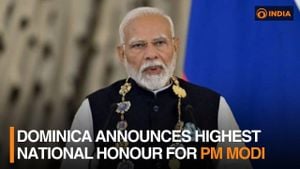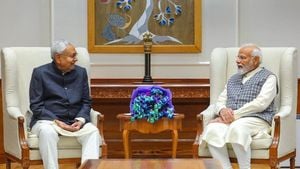With political tensions rising and the world watching every move, UK politics took center stage once again during the recent Prime Minister's Questions (PMQs). This time, the spotlight shone brightly on Nigel Farage, known for his colorful rhetoric and controversial stances. His presence at the House of Commons raised eyebrows, particularly concerning relations between the UK and the incoming Trump administration.
Farage’s appearance came right at the cusp of significant shifts, as discussions around the future of the Chagos Islands surfaced. Recently, Stephen Doughty, the UK's foreign office minister, made headlines by asserting the need for strong diplomatic relations to navigate the transitional period between administrations. He highlighted the complex and sensitive nature of the UK's negotiations surrounding the Chagos Islands—a territory with longstanding tensions rooted deep within historical colonial ties.
For those unfamiliar with the backstory, the Chagos Islands, located in the Indian Ocean, were home to indigenous communities until the British government forcibly removed them during the 1960s to allow the United States military to establish a base on Diego Garcia, one of the islands. This controversial history has turned the Islands' sovereignty and the plight of its former inhabitants—and their descendants—into hot topics within UK politics.
On Wednesday, Doughty stated, "If the UK had not negotiated with Mauritius over the islands, then it seemed inevitable we would face legally binding decisions against us." His remarks aimed to clarify the government’s route on addressing US concerns and reaffirm its commitment to international laws and relations.
Farage, who founded Reform UK and has maintained significant influence on right-wing sentiments within the UK, voiced concerns about the current approach to negotiations. Speaking at PMQs, he stated there exists "outright hostility" from the Trump administration toward the UK’s handling of the Chagos Islands deal. This statement underscored the delicate balancing act the UK must perform as it seeks to maintain strong ties with the US amid criticisms of its diplomatic maneuvers.
Adding snippets of humor to the political fray, Labour leader Keir Starmer took the opportunity to throw shade at Farage. He remarked on Farage’s frequent absences from the UK, implying his priorities might lie elsewhere. Starmer's quick wit aimed to reshape the narrative and remind the public of the importance of local constituency work over international fame.
Starmer's retorts often contrasted sharply against Kemi Badenoch, the Minister for Equalities, who faced off against him during the PMQs. When pressed on financial matters, Badenoch expressed her openness to reconsider additional spending under future budget measures. This stance has sparked criticism from Labour, emphasizing flaws within the Conservative government’s strategy, particularly as the nation grapples with a cost-of-living crisis.
Meanwhile, anticipated scrutiny is on the forthcoming discussions over the proposed Chagos Islands deal with Mauritius. Farage's mention of "hostility" from the new Trump administration has caused some alarm, highlighting the complexity of how domestic politics intermeshes with foreign relations. Farage’s voice resonates not just as rhetoric but as a signal, reflecting the potential consequences of shifting political tides.
The gravity of concerns surrounding the Chagos Islands intensified as it became apparent the UK is at risk of facing international backlash. The Prime Minister's reputation is at stake if complaints from displaced Chagossians and their supporters are ignored. Street protests calling for reparations and the reestablishment of rights for Chagossians are gaining traction, propelling this issue to the forefront of political discourse.
And so, as PMQs unfolded, the stakes were not just parliamentary exchanges—this was about identity, ownership, and the enduring legacy of colonialism. At its core, it confronts the UK’s role on the global stage, particularly as it relates to ethics and historical accountability. For many political analysts, it marks the beginning of another chapter, where the legacy of past decisions hounds the present.
Badenoch's defense mechanisms during PMQs suggested the administration is working hard to mitigate potential fallout. “When Trump is briefed fully about our Chagos discussions, I’m confident many concerns will be allayed,” she asserted, striving to set expectations for what might lie ahead.
Bluntly, the future of the Chagos Islands could redefine not only UK foreign policy but also citizens' sentiments closer to home. David Blunkett, the former Labour cabinet minister, commented insightfully at the session, stating, "We could end up with Nigel Farage as PM if Labour does not improve people’s lives." His warning laid bare the reckoning for Labour, pressing them to address the very life issues fundamental to their constituents.
Trying to navigate the turbulent waters of UK politics, Labour is observing closely both Farage’s moves and the shifting dynamics introduced by Trump’s influence. Indeed, as the UK emerges from the shadow of Brexit and wrestles with its newfound identity, it becomes evident how much it hangs upon the reactions of its closest allies and domestic influencers alike.
Breaking down party loyalty and weighing arguments for and against financial allocations have placed PMQs under scrutiny. Keir Starmer, as leader of the opposition, deftly articulates Labour's commitment to stability and reform, seeking to draw comparisons with the disjointed approaches of Conservative governance.
This latest session wasn’t merely about who bested whom during heated exchanges; it encapsulated the essence of where Britain stands at this pivotal moment. It boils down to far more than party lines, touching lives impacted by both domestic policy and international negotiations.
One cannot understate the connection between past and present, where decisions made decades ago resurface sharply within the current political climate. The contrasting approaches to fundamental human rights and international laws reiterate the need for ethical governance. How the UK handles this chapter may shape perceptions both internally and externally long after all these sessions have concluded.
Farage’s influence, particularly among right-wing voters, adds another layer of complexity to the atmosphere. His claims about political entitlement resonate with those who feel left behind by traditional politics, and if not skillfully managed, may lead to consequential shifts.
Starmer, exemplifying what critics believe is cautious, yet responsible leadership, has attempted to address citizens' pressing needs head-on. Balancing local responsibilities against the urgency to respond to historical grievances may yet prove to be Labour's wheelhouse — should they secure public confidence.
After all, democratic processes are woven complexly with the lived experiences of those seeking representation. So as the curtain falls on another round of PMQs, the most pressing question remains: can the UK promote healing on former territories and potentially mend past indiscretions, or will the flames of discord continue to stoke the political ambitions of figures such as Farage, shading their agenda with historical grievances?
Moving forward, it's more apparent than ever this is just the tip of the iceberg. The reverberations of this complex dance of politics require close monitoring, and the results could redefine national identity for years to come.



